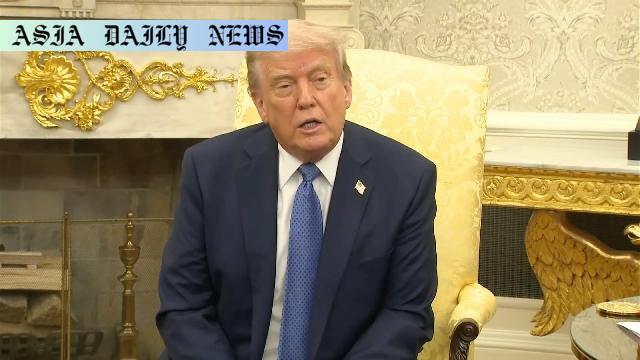Crimea: US President Trump admits Ukraine faces difficulty in reclaiming Crimea amidst ongoing peace negotiations.
- Crimea’s return to Ukraine deemed very difficult, says Trump.
- Peace talks complicated by recent airstrikes in Kyiv.
- Trump admits Russia’s concessions involve halting further invasion.
- Ukraine’s President Zelenskyy rejects Crimea’s occupation by Russia.

Crimea: A Complex Geopolitical Issue
The annexation of Crimea by Russia in 2014 remains a pivotal moment in global geopolitics. US President Donald Trump’s recent remarks shed light on the ongoing complexity of resolving the conflict. According to Trump, it would be “very difficult” for Ukraine to reclaim Crimea. His statement underscores the geopolitical and military challenges of reversing Russia’s control in the region. The annexation, which occurred during the height of Ukraine’s political instability, was met with widespread international condemnation. Despite sanctions and diplomatic pressure, Russia has maintained a firm hold over Crimea, claiming it as a rightful return to its territory.
During a recent press conference, Trump also expressed his disapproval of the ongoing violence in Ukraine. Referring to a Russian missile strike that killed 12 people in Kyiv, he stated, “I didn’t like last night.” The US administration has reportedly been working on peace initiatives, but incidents like these highlight the fragility of talks and the persistent volatility on the ground. Trump acknowledged that Russia’s concessions in the proposed peace plan include halting further advancements in Ukraine, calling this a major compromise from their side.
Peace Talks and the Challenges of Resolution
The Trump administration’s peace plan has generated significant attention, particularly regarding its inclusion of a potential “de jure” recognition of Russia’s control over Crimea by the United States. While such a move might facilitate progress in negotiations, it could also face backlash from Ukraine and its allies. Ukrainian President Volodymyr Zelenskyy has publicly declared that Ukraine will not recognize the Russian occupation of Crimea. For Kyiv, the peninsula is an integral part of its sovereignty, and any compromise on this matter would be seen as a betrayal of Ukraine’s territorial integrity.
The international community remains divided on how to address the crisis. While some advocate for a diplomatic solution that might include difficult compromises, others insist on maintaining a hardline stance against Russia’s aggression. With Ukraine still grappling with ongoing military confrontations and humanitarian challenges, the road to lasting peace appears uncertain. Trump’s remarks highlight the key dilemma faced by negotiators: balancing the pursuit of peace with the principles of sovereignty and territorial integrity.
Broader Implications for Global Politics
The Crimea issue is more than just a bilateral conflict; it is a test case for the international order and the enforcement of international laws. Russia’s unilateral annexation violated the UN Charter and the principles established by treaties such as the Budapest Memorandum. Allowing de facto control to evolve into de jure recognition could set a dangerous precedent for future violations of territorial integrity. This is why nations like Ukraine continue to insist on reclaiming Crimea, despite the considerable odds stacked against them.
Trump’s comments also shine a light on the broader strategic calculus at play. For Russia, retaining Crimea is not just about territorial control but also about projecting power in the Black Sea region. For Ukraine, losing Crimea is not only a territorial loss but also an impediment to its sovereignty and unity. For the US and its allies, finding a solution that prevents further destabilization in Eastern Europe while upholding international norms is a significant geopolitical challenge. This ongoing conflict will likely remain a focal point of global diplomacy for years to come.



Commentary
The Geopolitical Ramifications of Crimea
The question of Crimea’s status is undoubtedly one of the most polarizing and contentious issues in recent history. President Trump’s acknowledgment of the challenges Ukraine faces in reclaiming the territory reflects not just the entrenched positions of the parties involved, but also the broader geopolitical dynamics at play. Russia’s annexation of Crimea in 2014 represented a fundamental challenge to the post-World War II international order, setting a precedent that territorial integrity could be undermined by force. This event has since been a flashpoint for tensions between NATO and Russia.
Challenges of Peace Negotiations
The peace talks between Ukraine and Russia, as highlighted by Trump’s remarks, remain fraught with difficulties. While the proposed concessions from Russia, such as halting future territorial advances, might seem significant, they do little to address the root cause of the conflict: Crimea. For Ukraine, conceding Crimea’s status would strike at the heart of its sovereignty and embolden further aggression in the future. For Russia, retaining Crimea is integral to its strategic and political ambitions. Striking a balance that satisfies both parties seems implausible under current circumstances.
Seeking Solutions Amid Complexity
The international community must tread carefully in its response to the Crimea issue. Any resolution must consider the long-term implications for global norms and regional stability. While diplomatic efforts should be pursued relentlessly, they must not come at the cost of compromising fundamental principles, such as territorial integrity and sovereignty. As the world watches developments unfold, one thing is clear: the Crimea question will continue to shape global politics and diplomacy in profound ways.